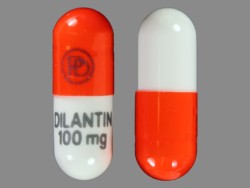Top Class Actions’s website and social media posts use affiliate links. If you make a purchase using such links, we may receive a commission, but it will not result in any additional charges to you. Please review our Affiliate Link Disclosure for more information.

Dilantin, which is commonly prescribed to treat epilepsy, has been associated with SJS for years; however, new research indicates that consumers with certain gene variants may be at an increased risk for developing the severe medical condition.
JAMA published a Dilantin study that focused on a genetic link between Dilantin consumers and those who developed Stevens Johnson Syndrome.
Researchers analyzed more than 100 SJS cases involving Dilantin patients who developed SJS or the more advanced condition Toxic Epidermal Necrolysis (TEN). They also studied 130 Dilantin patients who had no adverse reaction as well as 3,600 individuals from Japan, Taiwan, and Malaysia who were not taking the medication at all.
Using the data collected from the genetic study, researcher found that those patients with variants of the CYP2C gene were more likely to develop SJS while taking Dilantin.
These findings have the possibility of helping Dilantin patients discover if they are at a higher risk of developing Stevens Johnson Syndrome before taking the medication. Researchers state that a better understanding of how genetics increase the risk of Dilantin SJS can only help patients avoid the deadly skin rash.
Dilantin Side Effects
The U.S. Food and Drug Administration approved Dilantin to treat convulsions and the drug is often used by patients undergoing brain surgery as a preventative treatment of inadvertent seizures. However, the agency has started warning Dilantin patients about the possible risk of SJS or TEN.
Stevens Johnson Syndrome is an allergic drug reaction that is considered a dermatological emergency. Initial SJS symptoms are similar to the flu as patients report experiencing chills, body aches and even a fever. However, what comes next has been described as horrific.
Dilantin SJS symptoms quickly turn into a purple or red rash that develops across the skin and mucous membranes, especially on the trunk and face. The SJS skin rash requires weeks and even months of hospitalization as patients are treated in a similar method to burn victims.
When the Dilantin rash can be contained to 30 percent of the body it is considered Dilantin SJS but if it spreads beyond that, it is then referred to as Toxic Epidermal Necrolysis. If physicians determine that it is Dilantin causing the allergic skin condition they will advise patients to permanently avoid the medication.
Each year, about 300 patients are diagnosed with Stevens Johnson Syndrome in the U.S. Up to 15 percent of SJS victims will die due to injuries, while the advanced version of the skin rash TEN is fatal in 40 percent of cases.
Dilantin SJS Lawsuits
More than 120 Dilantin lawsuits have been filed by plaintiffs claiming that the medication caused a life-threatening SJS skin rash.
In general, a SJS Dilantin lawsuit claims that drug manufacturer Pfizer intentionally omitted an SJS warning from the label, while knowing about the risk.
Do YOU have a legal claim? Fill out the form on this page now for a free, immediate, and confidential case evaluation. The SJS attorneys who work with Top Class Actions will contact you if you qualify to let you know if an individual lawsuit or Dilantin class action lawsuit is best for you. [In general, Dilantin lawsuits are filed individually by each plaintiff and are not class actions.] Hurry — statutes of limitations may apply.
ATTORNEY ADVERTISING
Top Class Actions is a Proud Member of the American Bar Association
LEGAL INFORMATION IS NOT LEGAL ADVICE
Top Class Actions Legal Statement
©2008 – 2024 Top Class Actions® LLC
Various Trademarks held by their respective owners
This website is not intended for viewing or usage by European Union citizens.
Get Help – It’s Free
Help for Victims of Stevens Johnson Syndrome
If you or a loved one were diagnosed with Stevens Johnson Syndrome (SJS) or toxic epidermal necrolysis (TEN) after taking a prescribed or over-the-counter medication, you may be eligible to take legal action against the drug’s manufacturer. Filing an SJS lawsuit or class action lawsuit may help you obtain compensation for medical bills, pain and suffering, and other damages. Obtain a free and confidential review of your case by filling out the form below.
An attorney will contact you if you qualify to discuss the details of your potential case at no charge to you.
Oops! We could not locate your form.












